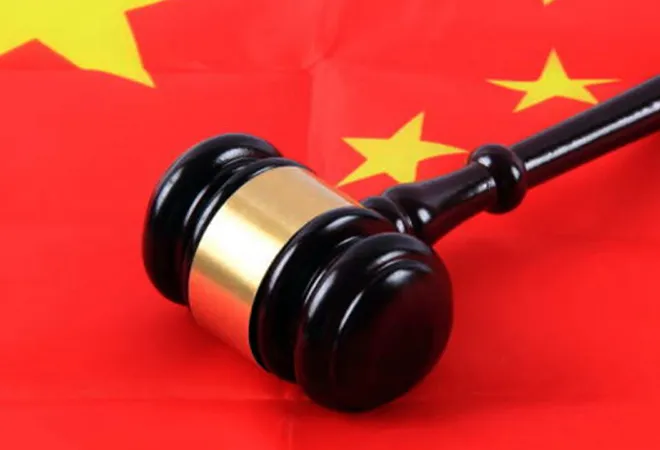-
CENTRES
Progammes & Centres
Location
With the Foreign Relations Law, China has added a new weapon to its arsenal against sanctions and further consolidates the Party’s grip on foreign engagement.

China recently passed new legislation on foreign relations, which expressly aims to protect its “sovereignty, national security and development interests.” The Law on Foreign Relations is in line with the prevailing situation as enunciated by China’s National Security Commission, which recently warned that the “complexity of the national security issues” facing China has increased exponentially. The apex body signalled that the nation should prepare to endure “severe tests” under adverse conditions and deal with worst-case scenarios. This points to a key change in China’s thinking, which now puts security ahead of development.
With the political debates in China centred on national security and the need to counter the “long arm” jurisdiction of the United States (US), the Law is expected to provide sinews to the Party-state to deploy its domestic legislation to retaliate against foreign sanctions. An essay on the Law, authored by Wang Yi, published in the Communist Party of China’s (CPC) journal Qiushi, states that the move will strengthen the centralised leadership of the Party Central Committee in foreign affairs, and rectify shortcomings in the legal system governing foreign relations. First, it shows the Communist Party’s intention to consolidate its grip on the nation’s external engagement. This was also evident from the elevation of Wang Yi as head of the Central Foreign Affairs Commission after the 20th Party Congress despite crossing the unofficial age bar. While the CPC’s unwritten code stipulated 68 as the retirement age for the elite, an exception was made for Wang who turned 69 last year.
The apex body signalled that the nation should prepare to endure “severe tests” under adverse conditions and deal with worst-case scenarios.
China clearing this law is also in line with the Communist Party of China’s lawfare approach, in which legislation is used as means to further strategic ends. The US has applied sanctions on Chinese Defence Minister Li Shangfu and other Chinese officials and put restrictions on technology companies like Huawei. In turn, China cleared an anti-sanctions law in 2021, which empowered Beijing to take countermeasures against foreign entities and individuals involved in discriminatory measures that “violate international laws”.
Wang’s essay in Qiushi goes on to add that risks and unpredictable factors looming over the country's development are the rationale for the law. The legislation has some external ramifications as it specifically mentions the Belt and Road Initiative (BRI), and mandates that the interests of Chinese nationals and organisations abroad must be protected. Xi’s signature project, the BRI, has led to China expanding its economic footprint globally. But China also runs the risk of getting entangled in local wrangles as it expands internationally, and its interests may collide against those of other entities. For instance, Chinese nationals and businesses were targeted in the Solomon Islands following claims that Chinese money was influencing parliamentary voting. This sparked a debate in China on protection of its nationals abroad with Guo Xiaobing, of the Arms Control Studies Centre of the China Institutes of Contemporary International Relations, arguing for improving China’s capability to protect its nationals since it was related to its economic security too. The Chinese foreign ministry has announced that the Solomon Islands will be the focus of its Belt and Road projects and special economic zones.
An investment is viable, if it can ensure future returns, which rests upon fickle variables like political stability. The foreign relations law begs the question as to what extent will the People’s Republic go to safeguard its citizens and economic interests abroad? China has been leaning on Pakistan to allow its own security companies in the latter country following a spate of fatal attacks on Chinese nationals. According to a Mercator report on BRI, there are nearly 5,000 private security companies registered in China. We have seen the disastrous consequences of Russia ceding control to a private non-state actor in the realm of security, and for meeting its strategic objectives. We also have the examples from history where the ‘flag’ accompanied by the British armed forces rose to the occasion to protect ‘trade’ and commercial and geopolitical interests of the Empire. Thus, nations that are the destination of BRI investment must take note of the ramifications of China’s new foreign relations law.
The legislation has some external ramifications as it specifically mentions the Belt and Road Initiative (BRI), and mandates that the interests of Chinese nationals and organisations abroad must be protected.
China has received flak for its approach of using its lending abroad for geopolitical and geoeconomics gains. Now as if to cover its tracks, the new law asserts that China respects the recipient nations’ sovereignty and that it does not attach political conditions to its financial assistance. However, evidence points to the contrary, particularly in the Yuan Wang 5 incident, where China leaned on an economically-enfeebled and debt-strapped Sri Lanka to permit docking of a research vessel that was equipped to track satellite and missile launches. Significantly, Canada has frozen ties with China-led Asian Infrastructure Investment Bank (AIIB) and is looking into allegations made by a former bank employee that the Communist Party of China had infiltrated the financial institution.
The new law is likely to have wide-reaching consequences for businesses, states, and dissidents, among many other stakeholders. Chinese dissidents could be punished for criticism of the state, or even for not being supportive enough of “Chinese interests,” whether they are in China or abroad. Businesses, particularly foreign ones, would have to be exceedingly cautious when entering into exchanges with Chinese companies, for fear of accusation of acting against China’s “development” or “security.” The law may also “squeeze” Taiwan’s diplomatic space, as countries and companies may think twice before supporting their cause against China for fear of legal retaliation and sanctions. Recently, there have been efforts to deepen India’s economic engagement with Taiwan, over which China asserts its sovereignty. Taiwan is also acting on its ‘China-plus-one’ approach and its technology firms are looking to shift operations to India from China, and there are plans to set up a Taipei Economic and Cultural Centre (its de facto diplomatic facility) in India’s financial capital, Mumbai. How this plays out with respect to nations like India remains to be seen as China may see these moves as an infringement of its development interests and national sovereignty.
Canada has frozen ties with China-led Asian Infrastructure Investment Bank (AIIB) and is looking into allegations made by a former bank employee that the Communist Party of China had infiltrated the financial institution.
To conclude, the law does not specify either the scope of Chinese “national security and development interests,” or the nature of the acts that may be in violation of the law, which makes its provisions particularly vulnerable to political interpretation. It has been described as “less of a legal provision” and “more of a political statement to the world” by Dennis Weng, associate professor of political science at Sam Houston University. Thus, with the Foreign Relations Law, China has added a new weapon to its arsenal against sanctions and further consolidates the Party’s grip on foreign engagement. It will intensify China’s competition with the West and other nations.
Kalpit Mankikar is a Fellow with the Strategic Studies Programme at the Observer Research Foundation.
Maya Prakash is an intern with the Strategic Studies Programme at the Observer Research Foundation.
The views expressed above belong to the author(s). ORF research and analyses now available on Telegram! Click here to access our curated content — blogs, longforms and interviews.

Kalpit A Mankikar is a Fellow with Strategic Studies programme and is based out of ORFs Delhi centre. His research focusses on China specifically looking ...
Read More +